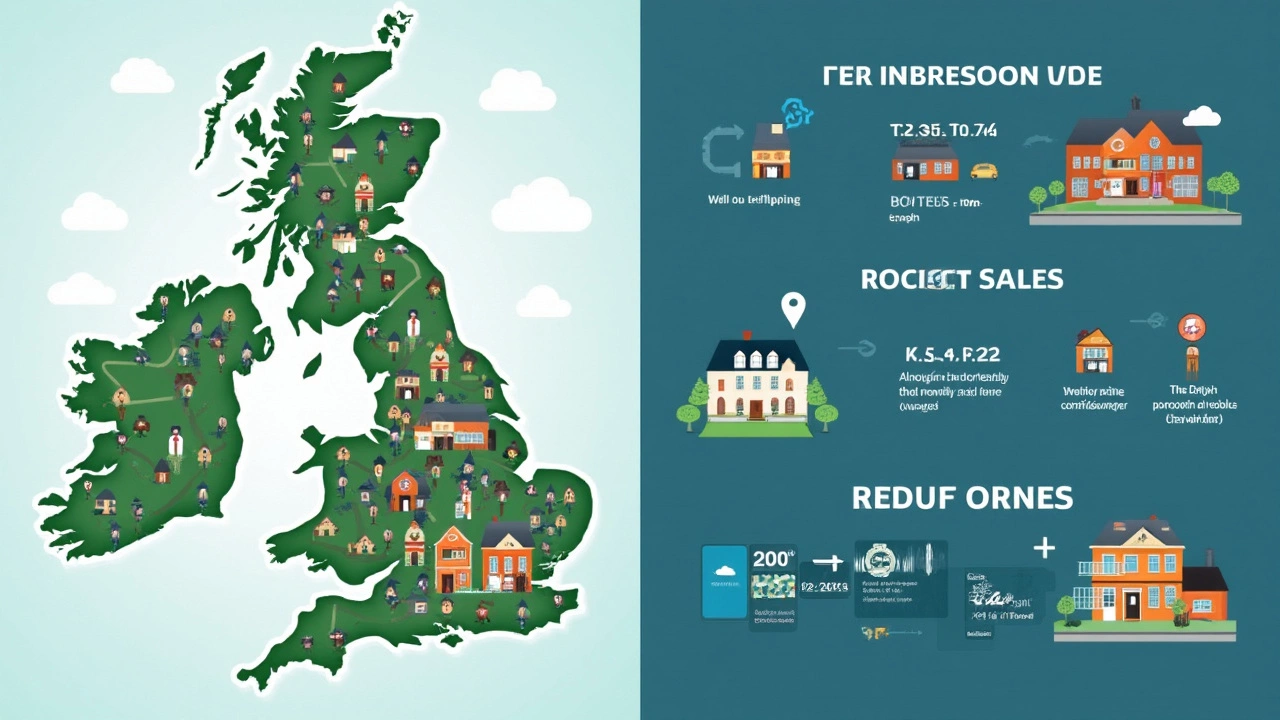If you’ve ever tried to figure out what your house is worth, you’ve probably stumbled across the term property valuation. But what does that actually mean? It’s not just what a friend thinks your place is worth or what you paid years ago. Property valuation is a professional estimate of a property’s current market value, usually done by an expert or a licensed valuer. This number isn’t pulled from thin air—it’s based on real data and facts about your property and the local market.
People rely on these valuations for all sorts of reasons, like selling a home, refinancing a mortgage, or just wanting to know where they stand in the market. If you’re wondering why the neighbor’s house sold for more, or why banks sometimes want their own independent checks, understanding property valuation clears up a lot of that confusion. It's all about getting an accurate snapshot of worth, not just guesswork or gut feelings.
- What Does Property Valuation Actually Mean?
- How Valuations Are Done
- Who Needs Property Valuation (and When)?
- Surprising Factors That Affect Value
- Quick Tips to Boost Your Property’s Worth
What Does Property Valuation Actually Mean?
Property valuation is basically putting an accurate price tag on a property at a specific point in time. It’s not about guessing or wishful thinking—it’s about finding out what a home or building would actually sell for if it hit the market today. This isn’t just for buyers and sellers, either. Lenders, insurers, and even tax authorities all care about this number. It impacts mortgages, home insurance, taxes, and even inheritance decisions.
The process usually uses set methods and real data. Professional valuers compare your property to similar places that have sold recently, look at the condition of your home, check out the location, and consider any renovations or features that can raise (or lower) its worth. The result: a fair market value—basically, how much someone would realistically fork over for the property.
Here are a few key reasons why property valuation matters so much:
- It helps set the right price, whether you’re selling or buying.
- Banks use it to decide loan amounts when you’re refinancing or buying.
- It’s often needed for property settlements, divorce, or splitting up an estate.
- Insurance companies use it to work out coverage levels and premiums.
To put this into perspective, check out how some common property types stack up in recent valuations (based on Australian CoreLogic figures for 2024):
| Property Type | Average Valuation ($AUD) |
|---|---|
| Detached house | 900,000 |
| Apartment | 610,000 |
| Townhouse | 750,000 |
Valuations aren’t permanent. They reflect the market at a certain moment. If interest rates drop or a huge new park opens nearby, your property’s value can change—not next year, but sometimes in just a few months. So, if you’re making big financial decisions, make sure you’re working from a current valuation, not one that’s a few years old and way off base. Think of it as your property’s price selfie—timely and real.
How Valuations Are Done
So, how do the pros figure out what your place is really worth? They don’t just eyeball things. A property valuation is a step-by-step process that digs into the details of your home and compares them with what’s happening in the local real estate market.
The job usually starts with a visit from a certified valuer. They walk through your place looking at its condition, size, layout, renovations, and even details like natural lighting or street noise. If you’ve ever wondered why it matters if your kitchen is new or the roof was recently replaced, this is why—these details go straight into your valuation.
Next, the valuer pulls together data from several sources. Here’s what that looks like in practice:
- Sales comparison: Checking prices of similar homes nearby that sold recently.
- Inspection report: Notes on your property’s features and any wear or repairs needed.
- Market trends: Up-to-date info about your area’s demand, supply, and price movements.
- Zoning and regulations: Sometimes legal stuff affects price, like zoning laws or building restrictions.
Valuers have access to databases packed with recent sales and listings—far more than what you’d see skimming property sites.
Time matters, too. Standard property valuations usually take one to two days for the inspection and another day or two to crunch the numbers and deliver a report. Here’s a quick look at the main info valuers consider, laid out in this table:
| Key Factor | What It Includes |
|---|---|
| Location | Proximity to shops, schools, transport, crime rates |
| Land Size | Total square meters or acres |
| Building Size/Condition | Number of rooms, renovations, damage or upgrades |
| Comparable Sales | Recent sales in the area (usually in the past 6-12 months) |
| Market Conditions | Supply, demand, interest rates, local property cycle |
The final valuation isn’t a wild guess—it’s backed by all this info, checked for accuracy, and written up in an official report. Lenders, buyers, and sellers all use these reports to guide real estate decisions, making it a big deal for anyone stepping into the housing market.

Who Needs Property Valuation (and When)?
You don’t have to be a property mogul to need a proper property valuation. Turns out, more people rely on valuations than you might think—and plenty of situations call for a real, unbiased figure instead of a wild guess.
Here’s a run-down of when and why most folks need property valuations:
- Selling your home: You want a realistic asking price. Overpricing can scare off buyers. Underpricing means leaving money on the table. An official valuation helps nail that sweet spot.
- Buying a home: Banks need to know a property’s real value before lending you mortgage money. They’ll often order their own valuation to double-check the property stacks up against the loan amount.
- Refinancing: Maybe you want to switch to a better mortgage rate, or borrow against your home’s equity. Lenders usually need a current property valuation as part of this process.
- Tax purposes: Some places require a valuation for things like calculating property taxes or inheritance taxes. These aren't random guesses—your tax bill could change based on this value.
- Insurance: If your home’s underinsured, you could get stuck footing the bill for repairs. Valuation helps make sure your coverage matches the true replacement cost.
- Legal matters: Divorces, estate settlements, or disputes about ownership often involve official valuations to keep things fair and square.
Real estate pros say that valuations aren’t a one-and-done deal. Markets shift, and so does your home’s value. Planning to sell soon? Experts recommend getting a new valuation every 1–2 years, especially in fast-changing cities.
Check out this simple table for some scenarios and how often you might need a valuation:
| Reason | Typical Frequency |
|---|---|
| Selling/Buying a home | Every transaction |
| Refinancing | Each refinancing event |
| Property tax assessment | Every few years (varies by location) |
| Insurance review | Every 1–3 years |
| Legal/Inheritance | Whenever required |
Bottom line? If you’re making a move in the real estate world or just want to keep your numbers straight, an accurate property valuation isn’t just helpful—sometimes, it’s the law.
Surprising Factors That Affect Value
Everyone knows about the basics—location, size, and the number of bedrooms. But some factors sneak up on people and seriously shake up their property valuation. Did you know the paint color in your living room or even having fiber-optic internet can bump the numbers up or down?
Here’s the thing: buyers and appraisers notice stuff owners sometimes overlook. For example, studies show homes near top-rated schools can be worth up to 20% more than similar homes a bit farther away. And, if your house is on a busy street versus a quiet one, that can lower your value even if everything else is equal. Strange, right?
Here are some less obvious factors that can change the game:
- Curb appeal: A messy yard or old mailbox might make buyers walk away before they’re inside. Fresh mulch and a mowed lawn have a real impact.
- Technology upgrades: Fast, reliable internet is a bigger deal now than a new bathtub. Many buyers prioritize smart home features too.
- Noise and neighbors: Living next to a noisy bar or train tracks drags value down. Friendly, quiet neighbors actually help.
- Unusual layouts: Open kitchens usually help, but a weird hallway or bathroom placement can turn buyers off.
- Natural light: Bright rooms look bigger and more cheerful—dark spaces feel cramped even if the footprint is large.
Check out this simple data table that shows just how much some of these factors can shift property values:
| Factor | Effect on Value |
|---|---|
| Nearby top-rated schools | Up to +20% |
| Busy road | -5% to -10% |
| Modern kitchen | +6% |
| Bad odor (pets, smoke, mold) | -10% or more |
| Solar panels | +4% to +6% |
| No off-street parking | -3% to -7% |
So before judging your home’s value based on size alone, think about these hidden factors. Even small changes can make a big difference.

Quick Tips to Boost Your Property’s Worth
If you want your property valuation to come back higher, start with basics that don’t break the bank. Small, thoughtful upgrades can sometimes add more value than massive renovations. Here are a few super practical moves that have proven benefits:
- Boost curb appeal: A tidy lawn, trimmed bushes, new mulch, or even a fresh coat of paint on your front door can make a surprising difference. First impressions really do matter—homes with strong curb appeal fetch up to 7% more, according to the National Association of Realtors (NAR).
- Deep clean and declutter: You wouldn’t believe how much a spotless home can influence perceptions of value. A professional clean can cost a few hundred bucks but may pay back way more at appraisal time.
- Fix the little things: Leaky taps, cracked tiles, chipped paint, or squeaky doors can lower your value in the eyes of buyers and valuers. These are quick fixes that show you’ve taken care of your home.
- Upgrade lighting: Swapping out old light fixtures or adding brighter bulbs makes rooms feel bigger and more inviting. Natural light is a big plus, but good artificial lighting works wonders too.
- Make kitchens and bathrooms shine: You don’t need a full remodel to impress. Changing cabinet knobs, faucets, or updating old appliances can freshen up these key areas without draining your savings.
- Energy efficiency: Double-glazed windows, better insulation, or smart thermostats are popular upgrades. Energy-efficient homes often get a higher valuation, especially as energy bills keep rising.
Here’s a quick look at which improvements offer the strongest returns, based on 2024 statistics from Remodeling Magazine:
| Improvement | Average Cost (USD) | Avg. % of Cost Recouped |
|---|---|---|
| Garage Door Replacement | $4,500 | 96.1% |
| Minor Kitchen Remodel | $28,500 | 84.1% |
| Entry Door Replacement (steel) | $2,300 | 77.6% |
| Deck Addition (wood) | $17,500 | 76.0% |
| Bathroom Remodel | $24,000 | 66.7% |
One last tip? Get to know the properties that have sold near you, especially the ones similar to yours. If they all have updated HVAC or smart home tech, yours will stand out for the wrong reasons if it doesn’t. Staying competitive with small upgrades can keep your value up—without major expenses.
